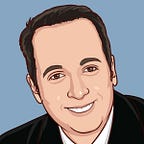As Partisans Blame Each Other For Anti-Semitism, The Pogrom Is Reborn
According to the United States Holocaust Memorial Museum, Pogrom is a Russian word that means “to wreak havoc, to demolish violently.” The museum’s website explains that, historically, the term references violent attacks “by non-Jewish populations on Jews…organized locally, sometimes with government and police encouragement.”
There appears to be collective resistance by both Jewish and non-Jewish sympathizers alike to refer to the recent spate of attacks on Jews, Jewish places of worship, and Jewish businesses as pogroms.
The reticence is understandable. But it is also inaccurate and dangerous.
Some feel that using such an historically provocative term will somehow diminish sympathy for current and future victims of targeted anti-semitsim, as if the months, years, and decades before the Holocaust were somehow much worse for Jewish practitioners, everywhere, and in every way, than they are now.
But is that really the case?
Those who believe Jews are primarily safe and somehow immune from a targeted attack, do so naively, having either not read up on the true history of pogroms (which were not always state-sanctioned nor always well-organized); or failing to recognize that while history may not repeat itself, it always rhymes.
Despite witnessing anti-semitism all around him during the 1920s and 1930s, Albert Einstein authored letters during that period demonstrating that he felt concerned but personally safe, for many years; only later recognizing the gravity of the danger and, eventually, of the need to flee.
Undoubtedly, many Jews feel the same way today: concerned, perhaps even very concerned, but generally safe.
But are Jews, especially outward practitioners of Judaism, truly safe right now? Are the media and government fairly covering all of the recent anti-semitic attacks, devoid of political and partisan blame? Or are the media and both sides of government complicit: assisting history in composing a new and very lethal rhyme?
The true history of pogroms reveal that some of these attacks were fomented by their simply being tolerated, obscured, or politicized by the media and politicians.
Is that not precisely what is happening today?
As anti-semitism soared in his city, Mayor Bill de Blasio outrageously attempted to create a partisan issue: making the demonstrably false statement that “the ideological movement that is anti-Semitic is the right-wing movement.” Others on the left have blamed the president, personally, for the rise in antisemitism. For their part, a growing number of pundits and politicians on the right are increasingly tossing the blame for anti-semitism primarily onto the left.
Both sides are dangerously wrong. And it doesn’t matter one iota whether one side is less wrong than the other.
The very existence of “sides” on this issue, itself vilely contributes to anti-semitism.
Anti-semitism is not political.
It exists among people with all sorts of political views. It is present on the far right and it is present on the far left and it is present everywhere in between.
Anti-semitism, like racism, and like all forms of bigotry, comes in all forms, from people of all views and political persuasions. Anyone, from any party, with any political view can be a racist, a misogynist, a homophobe, a bigot, or an anti-semite.
Sadly, few media outlets or politicians are willing to recognize the reality that anti-semitism exists on all sides and within all political ideologies. This faux ambiguity and disingenuous divide misleads the public and engenders the dangerous belief that one side is more immune than another to committing an act that would be viewed as genuinely anti-semitic.
When politicians and the media spend all of their time and effort blaming each other for these acts, instead of focusing on the underlying problem that is the hate, the disingenuous bickering provides incentive and cover for anti-semitic attacks because the media and politicians will always blame their perpetrator of choice, regardless of who the real perpetrator in each case really is, and regardless of where the hate is actually coming from.
When repeated and targeted attacks wreak havoc and violently attempt to demolish Jewish places of worship, Jewish businesses, and Jewish people, and when politicians and the media tolerate certain kinds of attacks more than others; these attacks are assuredly pogroms under any and all definitions of the nomenclature. The failure to call the horrific thing what it is only aids in its tolerance and perpetuation.
